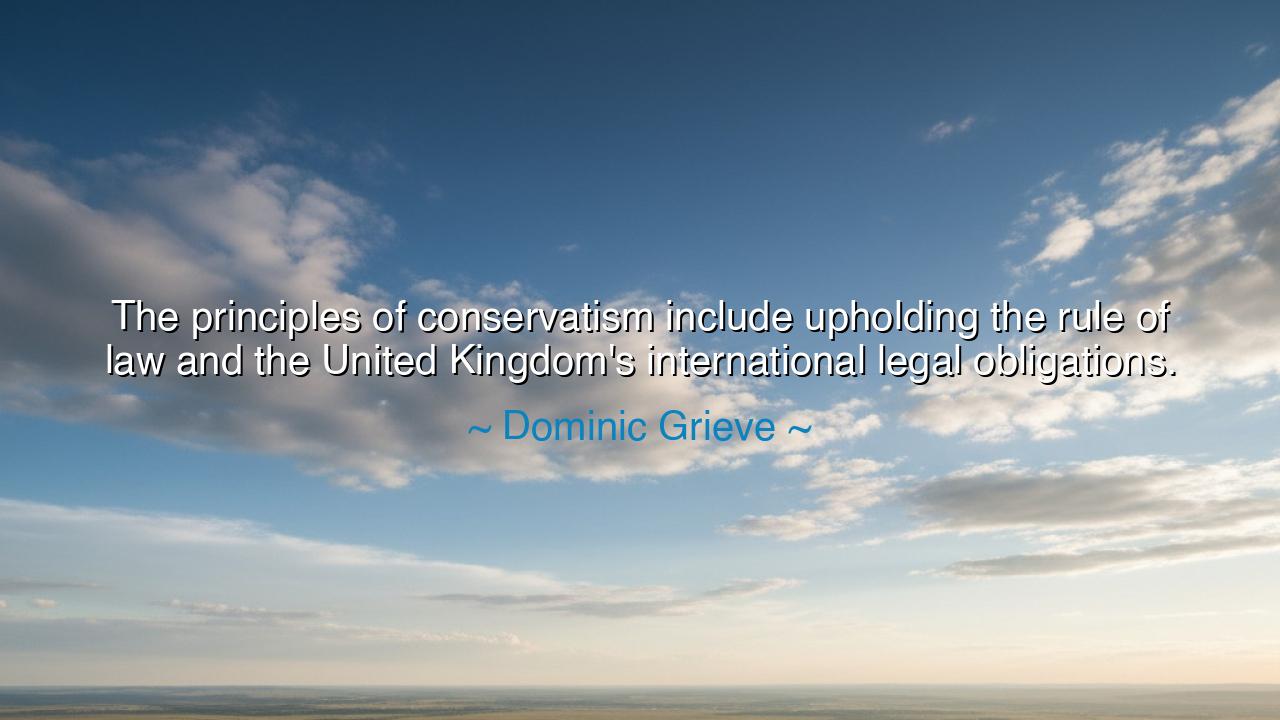
The principles of conservatism include upholding the rule of law
The principles of conservatism include upholding the rule of law and the United Kingdom's international legal obligations.






When Dominic Grieve declared, “The principles of conservatism include upholding the rule of law and the United Kingdom's international legal obligations,” he spoke not merely as a politician defending a policy, but as a guardian of civilization’s moral order. In those few words, he summoned an ancient truth that transcends party and nation: that power must always bow before law, and that the greatness of a people lies not in their might, but in their fidelity to justice. His statement reminds us that conservatism, in its truest and noblest form, is not about resisting change for its own sake, but about preserving those eternal foundations — duty, integrity, and accountability — upon which a free society rests.
In the style of the ancients, one might say that Grieve spoke as a modern statesman in the tradition of Cicero, who stood in the Roman Forum and cried, “We are servants of the law, that we may be free.” For what is the rule of law but the invisible architecture of liberty — the framework that holds chaos at bay and keeps tyranny from rising? It is the covenant between ruler and ruled, the promise that no man, however powerful, shall place himself above the law. In reminding his nation of this, Grieve was not speaking of dry statutes or bureaucratic formality, but of moral order itself — the sacred understanding that justice, once betrayed, brings ruin to all.
The origin of this quote lies in a time of political turbulence within the United Kingdom, when questions of sovereignty, Brexit, and international treaties tested the integrity of the state. Grieve, a barrister and Member of Parliament, sought to anchor his country’s debates in timeless principles: that law must govern even when passion runs high, and that honoring one’s international obligations is not a burden, but a mark of honor. His words recall the wisdom of the great conservative thinkers — Edmund Burke among them — who taught that tradition is not the worship of ashes, but the preservation of fire. To uphold the rule of law is to guard that flame from the winds of recklessness.
History provides many lessons in this truth. Consider the story of King John of England, who in 1215 was forced by his barons to sign the Magna Carta — the first great declaration that the monarch himself was subject to the law. That parchment, born of rebellion yet tempered by reason, became the seed from which modern constitutional government would grow. The Magna Carta taught the world that justice must be higher than any throne. Centuries later, the same spirit guided Britain’s leaders through war and empire, reminding them that their strength came not from conquest alone, but from their commitment to law, fairness, and duty — values that defined not only the kingdom, but its soul.
When Grieve speaks of the United Kingdom’s international legal obligations, he invokes this same moral lineage — the belief that a nation’s word, once given, is sacred. In an age of treaties and alliances, to keep one’s promises before the world is to preserve both peace and dignity. The ancients would have called this virtus — the moral courage to act rightly, even when expedience tempts otherwise. For when nations abandon their legal obligations, they trade integrity for convenience, and honor for power. And power, unbound by law, soon consumes those who wield it. Thus, to uphold international law is not weakness, but wisdom — the recognition that order among nations, like order within them, depends upon mutual respect and truth.
There is also in Grieve’s words a quiet rebuke to those who mistake conservatism for isolation or arrogance. True conservatism does not glorify the state at the expense of principle; it seeks balance, restraint, and continuity with the moral laws that govern all humanity. The conservative, in the purest sense, is not one who clings to privilege, but one who defends structure, justice, and accountability against the forces of disorder. The rule of law, then, is not a chain but a shield — protecting the weak from the strong, the just from the corrupt, and the nation from its own passions.
The lesson of Grieve’s statement is clear and enduring: that freedom and stability cannot exist apart from law, and that respect for obligation — whether personal, national, or international — is the measure of true strength. Every generation must guard this truth as its inheritance, for each faces the same temptation: to cast aside law when it seems inconvenient, or to bend it in the name of power. Yet history shows that when law yields to will, empires crumble, and liberty dies not with a roar, but with a whisper of indifference.
So, let these words be carried forward as a guiding star for all who lead and all who follow: to uphold the rule of law is to uphold civilization itself. In your home, in your work, in your nation, stand for what is just even when it is difficult; honor your word even when it costs you. For only through law bound by conscience, and power bound by principle, can any people endure. And when the tempests of politics rage, remember this eternal teaching — that the greatest act of strength is not to rule others, but to rule oneself beneath the sovereign light of justice.






AAdministratorAdministrator
Welcome, honored guests. Please leave a comment, we will respond soon